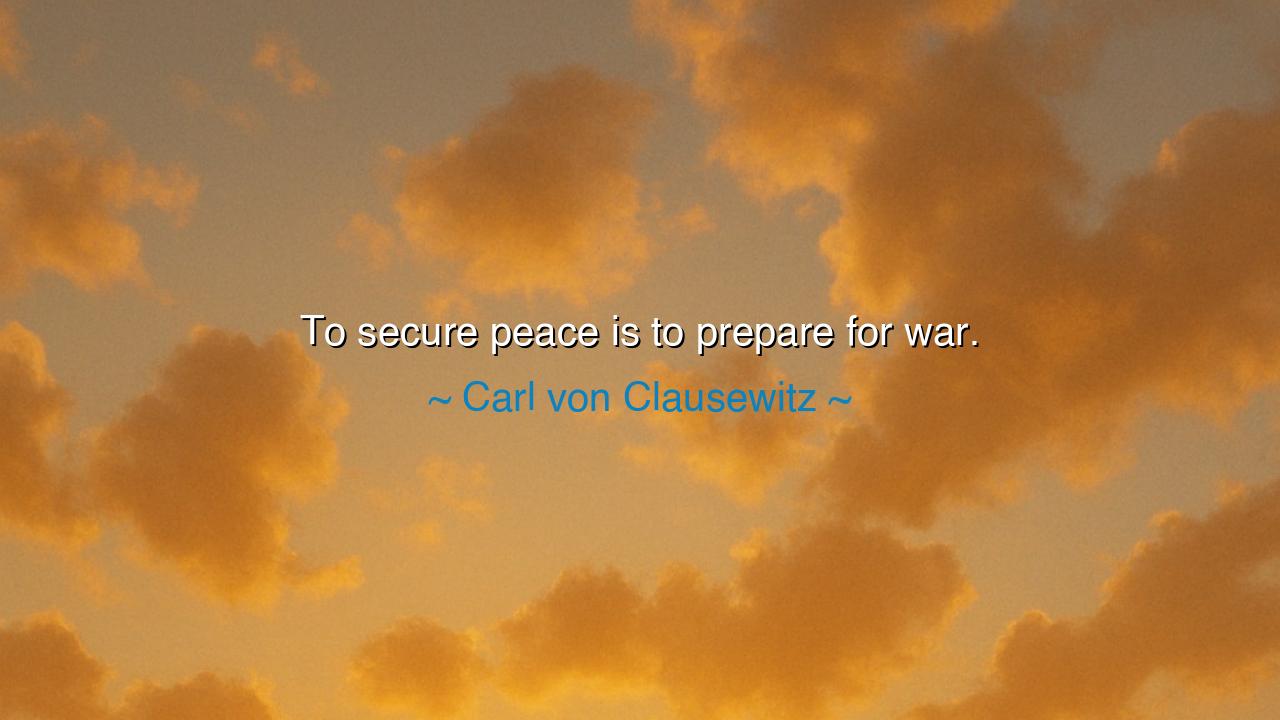
To secure peace is to prepare for war.






The words of Carl von Clausewitz—“To secure peace is to prepare for war.”—echo with the stern clarity of a general who gazed upon the brutal realities of power. This is no gentle proverb, but a truth forged in the furnace of history: that nations, like men, preserve peace not merely through prayers and treaties, but through strength, vigilance, and readiness. Peace without the will to defend it is but an illusion, a fleeting calm before the storm. Clausewitz speaks the law of survival, a law the ancients and the modern alike have learned by blood.
To secure peace is to recognize that peace is not natural to the hearts of men or to the ambitions of nations. Greed, pride, and envy forever stir in the world, threatening to overturn harmony. Thus, peace must be guarded, as one guards a treasure, and the guard’s hand must rest upon the sword. To prepare for war is not to lust after conflict, but to create the conditions in which aggressors dare not strike, knowing the cost would be too great. In this paradox lies the grim balance of human affairs: it is preparation for war that deters war itself.
The Romans knew this truth well, and their saying—si vis pacem, para bellum—“If you want peace, prepare for war,” became a cornerstone of their empire. Their legions, disciplined and ever-ready, were not always on the march, but their presence alone kept enemies cautious. Rome’s peace, the famed Pax Romana, was secured not by goodwill alone, but by the visible might of armies that stood ready to crush rebellion. It was the watchful sword that kept the roads safe, the seas open, and the provinces calm.
History gives us other examples. Consider the Second World War. The appeasement of Hitler in the 1930s, born from a desperate desire for peace, only emboldened aggression. Peace, unguarded by readiness, dissolved into catastrophe. Yet when the Allies finally armed themselves with full resolve, they secured not only victory but a long-lasting peace in Europe. Their error was not in wanting peace, but in forgetting Clausewitz’s lesson: peace cannot be secured without the preparation for war.
This principle does not belong only to nations but also to individuals. A man who wishes for peace in his household must also be strong enough to resist what would destroy it. A community that longs for harmony must be prepared to defend justice against those who would corrupt it. To prepare for war does not mean to live in constant violence—it means to cultivate discipline, courage, and resilience, so that when threats arise, they can be met without fear.
Yet let us not mistake Clausewitz’s words as a celebration of war. He does not glorify destruction but reveals a paradox of reality. True lovers of peace do not abandon strength; they wield it wisely. The soldier who trains for war does so not out of hatred, but so that his children may sleep without fear. The statesman who arms his nation does so not to conquer, but to deter. In this way, readiness for war becomes a tool of preservation rather than conquest.
The lesson for us is clear: never let your peace rest upon weakness. Whether in your own life or in the life of nations, guard what is precious with vigilance. Build strength not to destroy, but to protect. Do not deceive yourself that peace will endure without effort, for history shows otherwise. Peace is a harvest that must be defended by labor, discipline, and, when necessary, the readiness to fight.
So let Clausewitz’s words endure across the generations: “To secure peace is to prepare for war.” Do not despise this paradox, but embrace its wisdom. For in readiness lies safety, in vigilance lies freedom, and in strength lies the power to keep peace unbroken. And perhaps, by heeding this stern truth, we may one day build a world where the preparation for war is no longer needed—because peace, at last, has become the natural inheritance of mankind.






AAdministratorAdministrator
Welcome, honored guests. Please leave a comment, we will respond soon